- Home
- Harry Harrison
West of Eden e-1 Page 10
West of Eden e-1 Read online
Page 10
Next to the commander stood Malsas‹.
Vaintè stood rigid at the sight because she had put the existence of the other Eistaa completely from her mind. But memory and realization gripped her now, sending a knife of pain through her sharper than any physical blade.
Malsas‹, Eistaa of Inegban*. For whom this city was being built. Who would bring her people here upon its completion and rule in Vaintè’s place. Malsas‹, erect and alert with the look of certain authority in her eye. She was not ill nor was she old. She would be Eistaa of Alpèasak.
Vaintè remained frozen, so her thoughts would not be revealed in her movements, as Malsas‹, her followers and assistants, emerged from the uruketo and came towards her. Vaintè could only hope that formality might mask her true feelings.
“Welcome to Gendasi, Eistaa, welcome to Alpèasak,” Vaintè said, pleasure at the Eistaa’s presence as well as gratitude emotionally coloring her words of welcome.
“It is my pleasure to be in Alpèasak,” Malsas‹ answered, just as formally. But the last syllable of pleasure required an opening of the mouth to reveal her teeth — and she did not close her mouth after this for long seconds. This slight indication of displeasure was warning enough for Vaintè and would not be repeated. Vaintè was respected for the work she was doing — but she could be quickly replaced. Vaintè forced all thoughts of jealousy and treachery from her mind and lowered her eyes briefly in acceptance of the warning.
This brief exchange was so subtle that it went unnoticed by the other Yilanè. Affairs at this level were not their concern. Malsas‹ moved the aides and fargi even further away with a motion of rejection before she spoke again, so their future conversation could not be overseen or overheard as they walked back to the city.
“Last winter was cold and this one is colder. This summer there were no youths or fargi from Soromset seeking admission to Inegban*. When the weather was warmest I sent a party of hunters to see how the city was. It was dead. Soromset does no longer exist. It died just as Ergetpe died. The leaves of the city are dead, carrion crows peck the bones of the Yilanè who lived there. On the beaches and the warm waters of the landlocked Isegenet sea the Yilanè lived in three great cities…”
She broke the thought off there and Vaintè finished it for her.
“Ergetpe is dead of the cold. Soromset has followed her way. Only Inegban* remains.”
“Only Inegban* remains and each winter the cold draws closer. Our herds grow small and soon there will be hunger.”
“Alpèasak awaits.”
“Indeed it must — when the time comes. But now there is greater need to broaden the fields and increase the breeding of the animals. For our part we must breed more uruketo, but it is a slow labor that we were too late in starting. But there is hope now that the new strain will be successful. They are smaller than the creature I came in, but develop much faster. We must have enough of them to move the entire city in one summer. Now show me what they will find when they arrive in Alpèasak.”
“They will find this,” Vaintè said, indicating the trunks and veined walls and latticed floors of the city that stretched away on all sides of them. The rain had stopped, the sun emerged and glinted from the raindrops on the foliage. Malsas‹ signaled approval. Vaintè moved her arm in a circle.
“Beyond the city — the fields. Already filling with beasts of all kinds that please the eye and stomach.”
Vaintè signaled armed guards to precede them as they passed through meadows of grazing animals towards the outermost fields. Through the high-arched wall of thick trunks and thorns they could see the giant forms of the urukub eating green leaves at the jungle’s edge, while even at this distance they could hear the rumbling of the large rocks in their second stomachs that ground up and aided in the digestion of the immense amounts of food they consumed. Malsas‹ admired the sight in silence for some time before turning away and beginning the return to the heart of the city.
“You have builded well, Vaintè,” she said when their followers could hear them again. “You have all done well.”
Vaintè’s gesture of thankful acceptance was filled with sincerity behind the ritual movements. The acceptance and praise from the Eistaa, before all the others, was a mark of such distinction that no thoughts of jealousy or rebellion could possibly be in her head. At that moment she would have sincerely followed Malsas‹ to certain death. They let the others crowd close now as they walked, to listen and learn, for that was the only way to learn and remember. Only when they went through the opening in the Wall of History did their talk once again turn to darker things since the history in the wall is that of death.
Between the circle of the ambesed and the circle of the birth beaches stood the thorny Wall of History. Embedded in it were the symbolic defenses that once had meaning and importance. Could the Yilanè once have really brandished giant crabs such as the ones preserved here, held them in the ocean as weapons to defend the breeding males? It was said to be true, but not since the egg of time could it have been known to be true. The sharp nettles, the thorns themselves, these had been surely used in the past as they were used now. But what of these shells of giant scorpions? No one really knew any more — yet these ancient exoskeletons were carefully preserved and admired, had been taken with great delicacy from the wall of Inegban* and brought here as a sign of the city’s continuity.
Since the wall was living history as well, in the entrance, nearest to the beaches, were woven the preserved bodies of dead hèsotsan. Next to them the fanged skulls of the attackers they had killed.
At the very end was a round-domed skull, blank-eyed and bleached by the sun. It was surrounded by spear points and sharp blades of stone. Malsas‹ stopped before it and indicated curiosity and need for an explanation.
“One of the ustuzou that befoul this land. All of the skulls that you see here are from lice-ridden, fur-bearing, warm-stinking ustuzou that have threatened us and that we have killed. But this nameless species was the worst of all. With those sharp-edged stones they committed the deed that is worse than all other deeds.”
“They murdered the males and the children.” Malsas‹ spoke the words with the coldness of death itself.
“They did. We found them and killed them.”
“Of course. You are no longer troubled by them?”
“No. All safely dead. This species is not local but came from the north. We tracked and killed them, every one of them.”
“Then the beaches are now secure?”
“In every way except for the coral reefs. But they grow fast and when they are high enough there will be the first births. Then the birth beaches will be safe in every way.” Vaintè drew the claws of one hand over the whiteness of the skull. “Safe in particular from these infant killers.
“We shall never be bothered by them again.”
CHAPTER TWELVE
The eating that afternoon was special, a formal occasion to welcome Malsas‹ and her staff. Events of this kind were so rare that most of the younger fargi had never watched one before; they moved about with excitement all that day talking excitedly to each other — though few were listening. This was a very new and unusual thing to them. In their day-to-day existence the Yilanè, although they enjoyed their food, looking forward with anticipation to sleeping with stomachs full, the consuming of the meat itself was a solitary act. Each would present a broad leaf to one of the meat-preparers and receive a portion of deliciously enzymed meat which they would eat in some quiet spot. This was the way food was taken and they could not imagine how it might be otherwise. Very little work was done this day as the inhabitants of the city filled the ambesed, pressed tight against its walls, climbed into the lower branches of the palisade in their eagerness to watch.
After their inspection of the city and the fields, Vaintè and Malsas‹ made their way to the ambesed. There Malsas‹ met with one after the other of those responsible for the growth of Alpèasak, spending most of the time with Vanalpè. When she was satisfied wi
th what she had heard Malsas‹ dismissed them all and spoke to Vaintè.
“The warmth of the sun and the growth of this city has taken the winter from behind my eyes. I will return to Inegban* with this news. It will make the coming winter less cold for our citizens there. Eremais reports that the uruketo has been loaded and is well-fed and ready to swim at any time. We will eat, then I will leave.”
Vaintè communicated her grief at the sudden parting. Malsas‹ thanked her, but dismissed any thought of staying longer.
“I understand your feelings. But I have seen enough to know that the work here is in good hands. But the uruketo is slow: we must not waste a single day. Let us eat. You know Alakensi, my first advisor and efenselè. She will serve you meat at this time.”
“I am honored, highly honored,” Vaintè said, thinking only about the privilege of this offer, not letting her thoughts dwell at all on Alakensi whom she knew of old. A creature of devious mind and unkind plots.
“Good.” Malsas‹ gestured Vanalpè over. “Now we will eat. Alakensi, who is closest to me in all things, will serve Vaintè meat. You, Vanalpè, for what you have done in growing this city, in designing and expanding it so well, you are chosen to serve me.”
Vanalpè was as speechless as a youngster fresh from the ocean at this, radiating pride with every movement of her body.
“For this special occasion there are two meats,” Vaintè said. “One from the old world, one from the new.”
“Old and new shall blend in our interiors the way Inegban* shall blend into Alpèasak,” Malsas‹ said.
There were cries of appreciation at this from those who stood close, for she had spoken so well and the idea was so novel that they would tell each other about it and talk about it for some time. Vaintè did not speak again until those closest had repeated what Malsas‹ had said so that everyone would know.
“The meat from Entoban* is urukub, grown from the egg brought carefully to these shores, hatched in the Gendasi sun, grown large on Gendasi herbiage. There are others, but this one is the biggest, you have all seen it when you have passed the pasture at the swamp. You have all admired the sleekness of its hide, the arched length of its neck, the full-flesh of its flanks. You have seen it.”
There were murmurs of appreciation at this, for they all had seen the tiny head at the end of that long neck rising high up from the water with a great mouthful of dripping green vegetation.
“The first urukub to be slain, yet one so large that all here will eat their fill of it. Then for Malsas‹ and those who have traveled with her from Inegban* there will be a creature they have never eaten before, sharp-footed deer of the kind found only in this place. The eating will now begin.”
The two who would serve hurried away to return with the gourds of meat, each kneeling before the Eistaa she was to serve. Malsas‹ reached out and took up a long bone with a tiny black hoof attached, cool sweet flesh hanging loosely from it, tore a large bite from it, then held it up so all could see.
“Urukub,” she called out and all who heard her made comment on her humor. For the smallest bone in a urukub was bigger than this entire beast.
Vaintè was pleased. The eating went well. When they had finished, washing their hands in gourds of water that their servers held up to them, the ceremony was over and the others went to eat before darkness came.
With no one listening or watching for the moment Malsas‹ could speak in confidence to Vaintè. Her voice was soft and the motions of her limbs merely hints of movement.
“Everything said here today was more than true. Everyone has labored hard, you hardest of all. Therefore I know you can use the labors of the Daughters of Death I brought with me.”
“I saw them. They will be used.”
“Use them until they die!” Malsas‹’s teeth clacked together loudly with the force of her expression. “There are more and more of them, like termites eating away at the base of our city. See that they do not attempt to eat this city as well.”
“No possibility, not the slightest, of that happening here. I have hard and dangerous work for all of them. That is their fate.”
“We are of a single mind then. Good. Now about you, work-hardened, never-weary Vaintè. What can be done to help you more?”
“Nothing, we have all that we need.”
“You do not speak of personal need, but I know you can use assistance. Therefore it is my wish that the strength of my hand, first to me in everything, my efenselè Alakensi, be attached to your following. To be your first aide and share your labors.”
Vaintè would not permit herself the slightest movement, the softest word, for that would have revealed the spate of instant anger that engulfed her. But she did not have to speak. Malsas‹ looked her directly in the eyes, and eye to eye they both understood. Malsas‹ permitted herself just one little mocking gesture of victory, then turned and led her followers to the uruketo.
Had Vaintè possessed a weapon at that moment she would have sent a dart of death into that retreating back. Malsas‹ must have planned every moment of this even before she arrived. She had her spies in Alpèasak reporting on everything that happened here. She had known that as Eistaa here Vaintè would be reluctant to turn over power. Therefore the repulsive Alakensi had been brought here. She would sit at Vaintè’s side and watch and spy — and report everything that happened. Her presence would be a constant reminder of Vaintè’s certain fate. She would labor and build this city — and in the end she would be pulled down. For on that black day it would all belong to Malsas‹. Now she realized what had been done; her past was laid clear by her future. From the very beginning Malsas‹ had had it all planned. Let Vaintè work and struggle and build the city — and in the building construct her own fate.
Unknowingly Vaintè raked her foot along the floor, her thick sharp nails tearing at the wood. No! It was not going to be that way. In the beginning she had just wanted to rise through her own labors, to join those that led the city. No more. Malsas‹ would never rule here. Alakensi would die; her appointment had been her death notice. The details were not clear — but the future was. As winter closed in on Inegban* the sun shone on Alpèasak. Weakness ruled there while strength grew here. Alpèasak was hers — and none would ever take it from her.
In her rage Vaintè left the presence of others, walked through the city by the most circuitous route where only a few fargi could see her — and upon seeing her flee from the anger that radiated from the very impact of her stride. Death was in every movement of her body.
There was a guardpost, now deserted, high above the port. Vaintè went there and stood in the lengthening shadows while the loading of the uruketo was completed. The last cargo taken into it were the limp bodies of a number of deer. Vanalpè had improved upon the toxin, normally used to stun large animals so they could be moved. The new drug did not stun — nor did it kill — but rather brought the creatures to the very brink of death. Their heartbeats could barely be detected, their breathing was immensely slowed. Treated in this manner they could cross the ocean to Inegban*, needing neither food nor water, to provide needed meat for the hungry citizens there. It was Vaintè’s fervent wish, and she spoke it aloud though none could hear, that Malsas‹ be treated in this way. To lie dead but not-dead until the end of time.
When the uruketo left at dusk Vaintè returned silently and alone through the growing darkness and, despite the anger still possessing her, fell instantly asleep.
Sleep cleansed her mind of hatred, but in the morning it still lurked there at the edge of her thoughts. To those that saw her in the ambesed she appeared as always. But she had one glimpse of Alakensi across the ambesed and she had to turn away, rigid with hatred. Her temper was short as many discovered. It was Enge’s ill luck to approach her at this time.
“I have a small request, Eistaa,” she said.
“Refused. From you and your walking-dead creatures I want only work.”
“You were never cruel without a reason before this,” Enge
said calmly. “It is my understanding that to the Eistaa all citizens are equal.”
“Precisely. It is my decision that the Daughters of Death are no longer citizens^. You are work animals. You will labor until you die; that is your fate.” The memory surfaced, long put aside by the pressure of work, brought up now by the sight of Enge standing before her.
“The ustuzou you were teaching to talk. What of them? Time has passed, a great deal of time.”
“More time is needed, that is the request that I have. More time — or no time.”
“Explain yourself.”
“Each morning I begin to work with the ustuzou with hope that this will be the day of comprehension. Each evening I leave them with the strong sensation that it is all a wasted labor. The female is intelligent — but is it just the intelligence of an elinou that prowls the city seeking out and killing mice? The actions look intelligent but certainly are not.”
“What of the male?”
“Stupid, like all males. He will not respond, even when beaten. He just sits and stares in silence. But the female, like an elinou, responds to kindness and is pleasant to be with. But, after all this time, she can speak only a few phrases, usually wrong, and always bad. She must have learned them as a boat learns and they are surely meaningless to her.”
“I am not pleased at this news,” Vaintè said, nor was she. Enge could have been working in the fields all this time; her labors had been lost. The reasons for attempting to communicate with the ustuzou were no longer important. There had been no further threat from the creatures — while trouble from other sources was bad enough. But if the danger was gone the intellectual interest was still there. She voiced the question aloud.

 Arm of the Law
Arm of the Law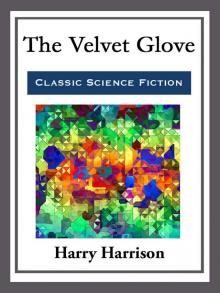 The Velvet Glove
The Velvet Glove The K-Factor
The K-Factor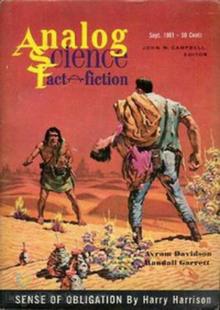 Sense of Obligation
Sense of Obligation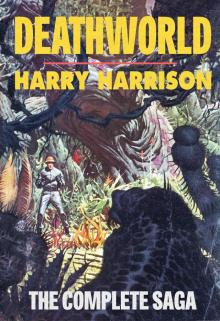 Deathworld: The Complete Saga
Deathworld: The Complete Saga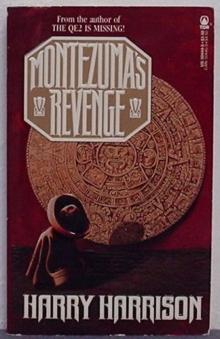 Montezuma's Revenge
Montezuma's Revenge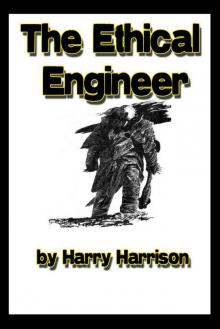 The Ethical Engineer
The Ethical Engineer The Stainless Steel Rat Returns
The Stainless Steel Rat Returns The Misplaced Battleship
The Misplaced Battleship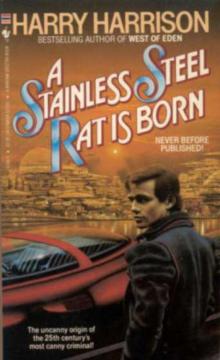 The Stainless Steel Rat is Born
The Stainless Steel Rat is Born Planet of the Damned bb-1
Planet of the Damned bb-1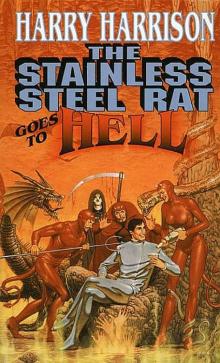 The Stainless Steel Rat Goes to Hell ssr-10
The Stainless Steel Rat Goes to Hell ssr-10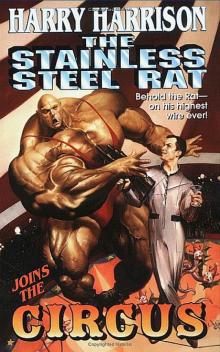 The Stainless Steel Rat Joins the Circus ssr-11
The Stainless Steel Rat Joins the Circus ssr-11 Galactic Dreams
Galactic Dreams The Harry Harrison Megapack
The Harry Harrison Megapack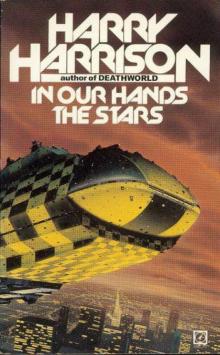 In Our Hands the Stars
In Our Hands the Stars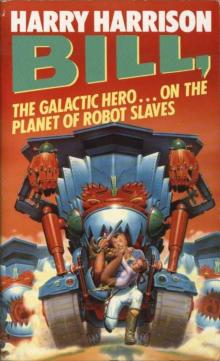 On the Planet of Robot Slaves
On the Planet of Robot Slaves The Military Megapack
The Military Megapack Make Room! Make Room!
Make Room! Make Room!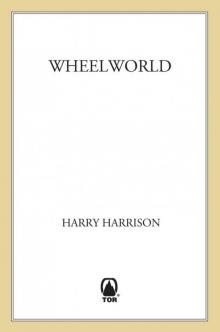 Wheelworld
Wheelworld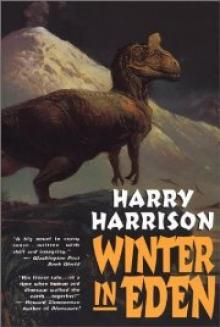 Winter in Eden e-2
Winter in Eden e-2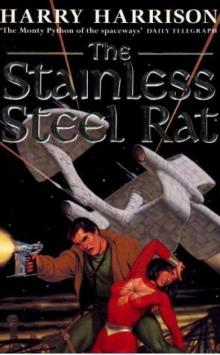 The Stainless Steel Rat
The Stainless Steel Rat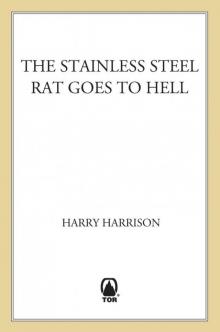 The Stainless Steel Rat Goes to Hell
The Stainless Steel Rat Goes to Hell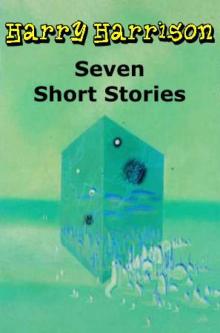 Harry Harrison Short Stoies
Harry Harrison Short Stoies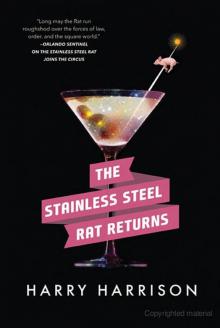 Stainless Steel Rat 11: The Stainless Steel Rat Returns
Stainless Steel Rat 11: The Stainless Steel Rat Returns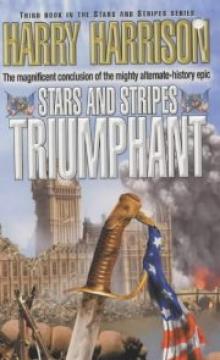 Stars and Stripes Triumphant sas-3
Stars and Stripes Triumphant sas-3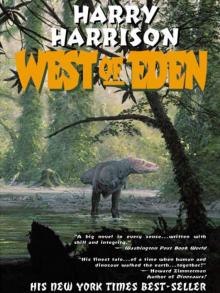 West of Eden
West of Eden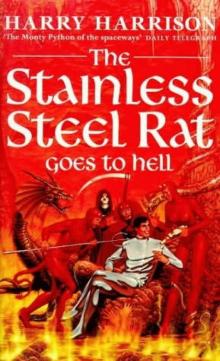 The Stainless Steel Rat Go's To Hell
The Stainless Steel Rat Go's To Hell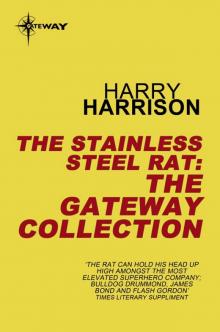 The Stainless Steel Rat eBook Collection
The Stainless Steel Rat eBook Collection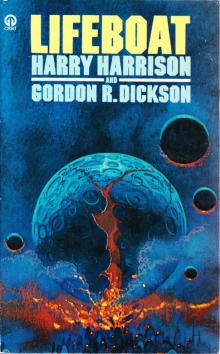 Lifeboat
Lifeboat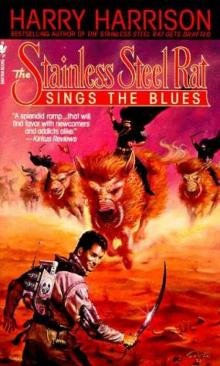 The Stainless Steel Rat Sings the Blues
The Stainless Steel Rat Sings the Blues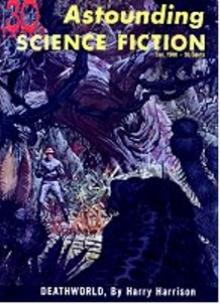 Deathworld tds-1
Deathworld tds-1 On the Planet of Zombie Vampires
On the Planet of Zombie Vampires The Daleth Effect
The Daleth Effect On The Planet Of The Hippies From Hell
On The Planet Of The Hippies From Hell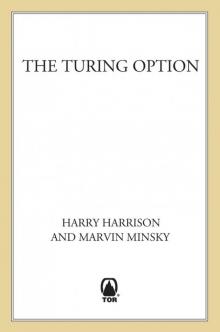 The Turing Option
The Turing Option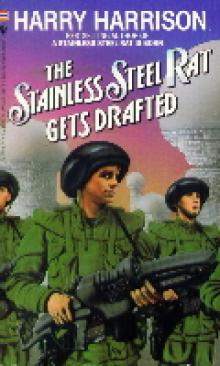 The Stainless Steel Rat Gets Drafted
The Stainless Steel Rat Gets Drafted Bill, the Galactic Hero btgh-1
Bill, the Galactic Hero btgh-1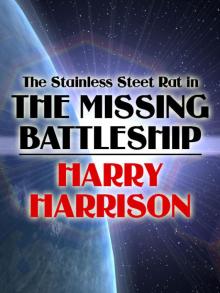 The Stainless Steel Rat in The Missing Battleship
The Stainless Steel Rat in The Missing Battleship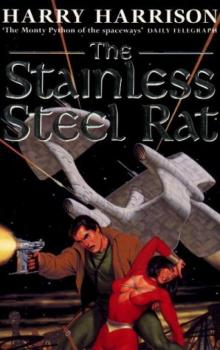 The Stainless Steel Rat ssr-1
The Stainless Steel Rat ssr-1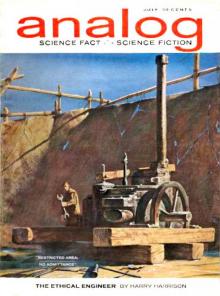 The Ethical Engineer (the deathworld series)
The Ethical Engineer (the deathworld series)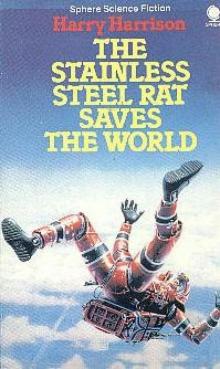 The Stainless Steel Rat Saves the World ssr-3
The Stainless Steel Rat Saves the World ssr-3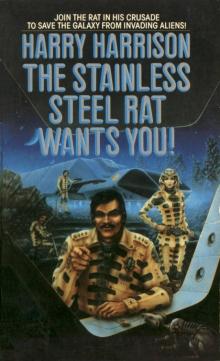 The Stainless Steel Rat Wants You
The Stainless Steel Rat Wants You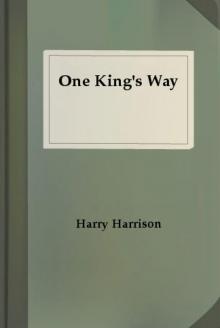 One King's Way thatc-2
One King's Way thatc-2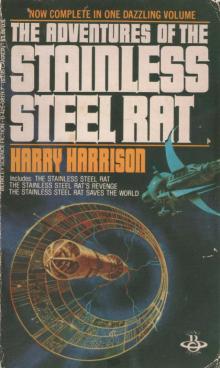 The Stainless Steel Rat Saves The World
The Stainless Steel Rat Saves The World Bill, the Galactic Hero
Bill, the Galactic Hero Stars & Stripes Forever
Stars & Stripes Forever Stars and Stripes In Peril sas-2
Stars and Stripes In Peril sas-2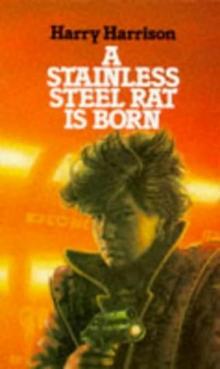 A Stainless Steel Rat Is Born ssr-6
A Stainless Steel Rat Is Born ssr-6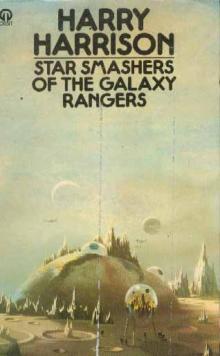 Star Smashers of the Galaxy Rangers
Star Smashers of the Galaxy Rangers Stars & Stripes Triumphant
Stars & Stripes Triumphant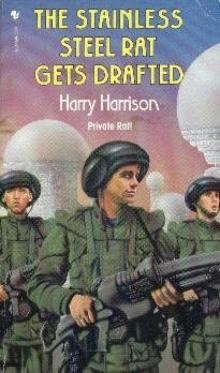 The Stainless Steel Rat Gets Drafted ssr-7
The Stainless Steel Rat Gets Drafted ssr-7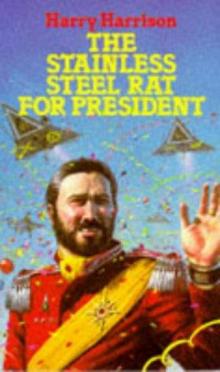 The Stainless Steel Rat for President ssr-5
The Stainless Steel Rat for President ssr-5 The Hammer & the Cross
The Hammer & the Cross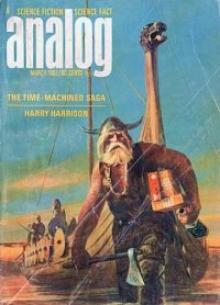 The Technicolor Time Machine
The Technicolor Time Machine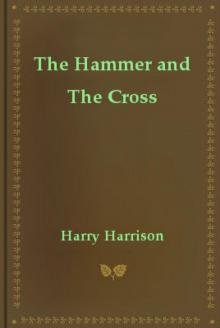 The Hammer and The Cross thatc-1
The Hammer and The Cross thatc-1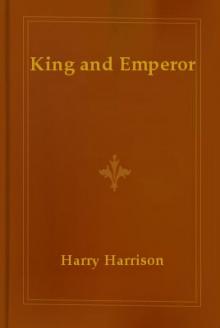 King and Emperor thatc-3
King and Emperor thatc-3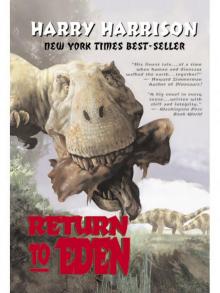 Return to Eden
Return to Eden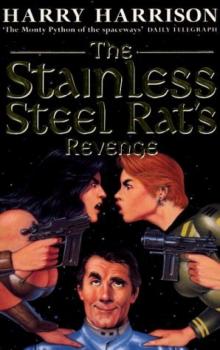 The Stainless Steel Rat’s Revenge ssr-2
The Stainless Steel Rat’s Revenge ssr-2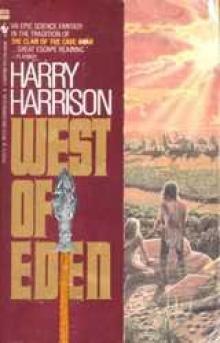 West of Eden e-1
West of Eden e-1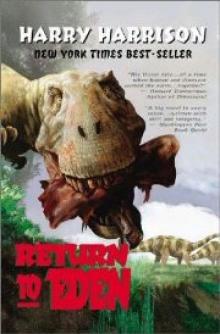 Return to Eden e-3
Return to Eden e-3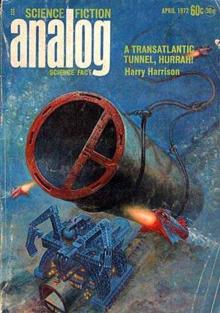 A Transatlantic Tunnel, Hurrah!
A Transatlantic Tunnel, Hurrah! Stars and Stripes Forever sas-1
Stars and Stripes Forever sas-1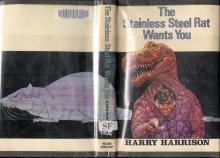 The Stainless Steel Rat Wants You ssr-4
The Stainless Steel Rat Wants You ssr-4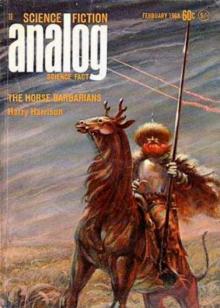 The Horse Barbarians tds-3
The Horse Barbarians tds-3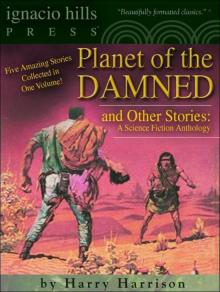 Planet of the Damned and Other Stories: A Science Fiction Anthology (Five Books in One Volume!)
Planet of the Damned and Other Stories: A Science Fiction Anthology (Five Books in One Volume!) On the Planet of Bottled Brains
On the Planet of Bottled Brains Stars And Stripes In Peril
Stars And Stripes In Peril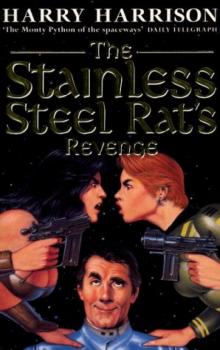 The Stainless Steel Rat's Revenge
The Stainless Steel Rat's Revenge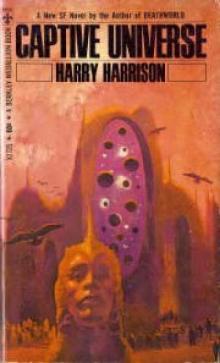 Captive Universe
Captive Universe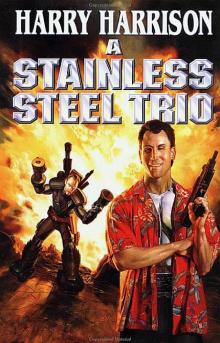 The Stainless Steell Rat Sings the Blues ssr-8
The Stainless Steell Rat Sings the Blues ssr-8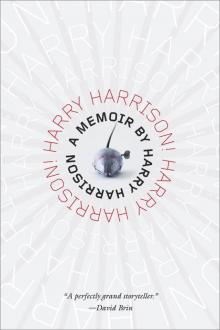 Harry Harrison! Harry Harrison!
Harry Harrison! Harry Harrison!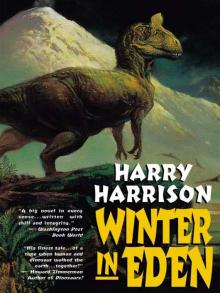 Winter in Eden
Winter in Eden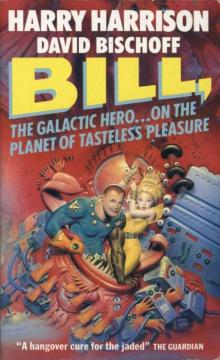 On the Planet of Tasteless Pleasures
On the Planet of Tasteless Pleasures